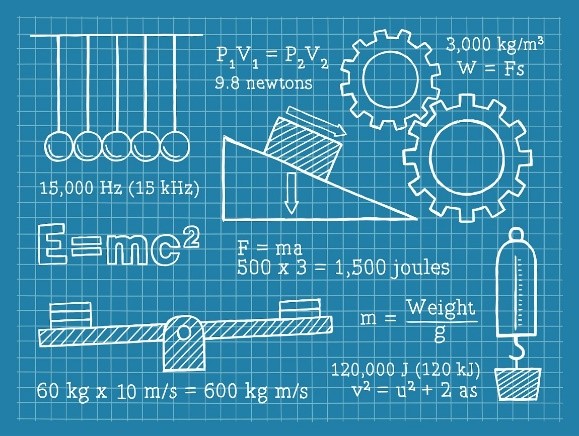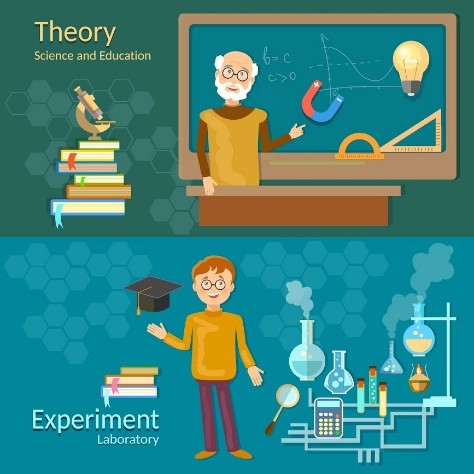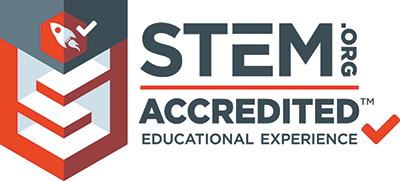Nature of Science – Ethical Practices
Grade 8 Science Worksheets
Introduction to Science
Science is an important field of knowledge dealing with observed facts and the relationships among those facts. It deals with the workings of the world and covers myriad branches –
Physical sciences – include astronomy, chemistry, physics, geology and meteorology
Life sciences – includes botany and zoology, anatomy, physiology, genetics, medicine and related areas
Mathematics and logic – includes arithmetic, algebra, calculus, geometry, statistics, logic and others
Social sciences – includes anthropology, archaeology, economics, political science, psychology, and sociology

Schedule a Free session to clear worksheet doubts
No credit card required, no obligation to purchase.
Just schedule a FREE Sessions to meet a tutor and get help on any topic you want!

How Scientists Work
Scientists use systematic methods of study to make observations and collect facts. These methods enable them to make discoveries or to develop theories. Scientific methods can be any of the following –
- Observing Nature – such as studying the motion of heavenly bodies to predict the seasons, or studying plants and animals to evolve the Theory of Evolution.
- Classifying Data – for example, the classification of elements into the Periodic Table.
- Using Logic or Reasoningto to draw conclusions, such as deducing Gravitational Force from an object falling to earth.
- Conducting experiments–which is the major tool for developing and testing scientific theories. The laws of nature, the circulation of blood, the properties of light, all these are examples of experimental outcomes.
- Forming a hypothesis – based on talent, skill and creativity, scientists first form a hypothesis and then use experimentation to test the hypothesis. The discovery of Neptune as a planet was the result of a hypothesis based on the movement of Uranus.
- Expressing findings mathematically – Galileo, Newton, Einstein, to name just a few, propounded mathematical equations to establish various relationships in nature such as for falling bodies and the relation of mass and energy.
Scientific methods can, therefore, vary from reporting based on Direct Observation and Recording of phenomena based on Experimentation and Testing to Inference and Prediction based on Logic and Hypotheses.
Ethics in Science
One very unique aspect of science (unlike fine arts or humanities) is the Scientific Rigor applied to repeated testing and verification of results of a scientific theory before it can be accepted as part of the scientific body of knowledge. Scientific progress takes place through new ideas expanding or replacing old ideas. New theories revise many of the previous ideas of earlier scientists only through repeated observations and experiments. Scientific knowledge is therefore constantly growing and improving upon itself.
This calls for Honesty and Integrity in all stages of scientific practice, from accurately reporting results to attributing the contributions of other scientists and collaborators. This is the foundation of Scientific Ethics. Some of the principles of scientific ethics are –
- Professional competence and professional discipline of the researchers
- Obtaining consent without discrimination or exploitation of research participants
- Respecting the privacy and confidentiality of research participants
- Integrity and objectivity in conducting scientific inquiry including removal of biases in observations and reporting
- Duty to society – whether the scientific inquiry benefits research

eTutorWorld Understands Math Tutoring | Online Math Worksheets are Important Tools
Understanding graphs, charts, and opinion polls in a newspaper, for calculating house and car payments, and for choosing a long-distance telephone service are impossible without strong math skills …and the only way to develop strong math skills is by constant practice.
‘Practice makes a man perfect’ holds true for no other field better than for math. A middle or high school student must set aside a minimum of an hour for math every day. Other than textbooks, worksheets help you revise and understand concepts better.
Our expert tutors prepare online maths worksheets that are age and grade-appropriate. Grade-wise math worksheets for Elementary Math, Arithmetic, Pre-Algebra, Algebra, Geometry, Trigonometry, Statistics, Pre-Calculus and Calculus can be solved to improve math skills, to get ahead or to even catch up.
You may download these FREE online math worksheets in the PDF format, and then print and email us their solutions for a free evaluation and analysis by eTutorworld’smath expert tutors.
You may solve these worksheets by yourself or with your peers while studying together.
The Answer Key at the end of each worksheet allows for a self-evaluation.
Personalized Online Tutoring
eTutorWorld offers affordable one-on-one live tutoring over the web for Grades K-12, Test Prep help for Standardized tests like SCAT, CogAT, MAP, SSAT, SAT, ACT, ISEE and AP. You may schedule online tutoring lessons at your personal scheduled times, all with a Money-Back Guarantee. The first one-on-one online tutoring lesson is always FREE, no purchase obligation, no credit card required.
For answers/solutions to any question or to learn concepts, take a FREE CLASS.
No credit card required, no obligation to purchase.
Just book a free class to meet a tutor and get help on any topic you want!

Check Point
- Which of the following is NOT a branch of science?
- Physics
- Botany
- Humanities
- Anthropology
- Which of the following is NOT a systematic scientific method?
- Classifying Data
- Using Logic or Reasoning
- Expressing findings mathematically
- Guesswork
- Which of the following is NOT an ethical practice in scientific inquiry?
- Obtaining the consent of research participants
- Manipulating data to suit the theory
- Removal of biases in observations and reporting
- Professional competence and discipline
Answer Key
- c) Humanities
- d) Guesswork
- b) Manipulating data to suit the theory
Schedule a Free session to clear worksheet doubts
No credit card required, no obligation to purchase.
Just schedule a FREE Sessions to meet a tutor and get help on any topic you want!
Pricing for Online Tutoring
| Tutoring Package | Validity | Grade (1-12), College |
|---|---|---|
| 5 sessions | 1 Month | $139 |
| 1 session | 1 Month | $28 |
| 10 sessions | 3 months | $269 |
| 15 sessions | 3 months | $399 |
| 20 sessions | 4 months | $499 |
| 50 sessions | 6 months | $1189 |
| 100 sessions | 12 months | $2249 |
8th Grade Free Worksheets
- The Universe
- Heredity
- Evolutionary Theory
- Structure of the atom
- Ethical Practices
- Unveiling the mystery behind the physical universe
- Components of the universe
- Celestial phenomena
- The tilt of Earth’s axis
- The causes of high and low tides
- Earth Systems
- Rocks and Fossils
- Weather and Climate
- Basics of chemical reactions
- Types of Chemical reactions – Endothermic, exothermic, oxidation, reduction reactions
- Catalysts and enzymes
- Compounds and mixtures
- Acids, Bases and pH Indicators
Images Credit:
https://lh3.googleusercontent.com/pw/ACtC-3euL-h8XRz0n8_1CjzsO3yj3vSp8lGTJ1y7oGjAMTCI7Mu5ehi-0m4w6Y68QgzCX-94AFbguw0ToVz_5bxjelOvCP55P7nOKzfri93TiubAnaGgT_DxKcqmT_Z9rEdKn2pee_3W2nCzM-A1wrHUKUV5=w1026-h867-no
https://lh3.googleusercontent.com/pw/ACtC-3cClHokWWH_yhN63o1Ixh64KjZxGGqK8kDEPZNj-PttQhIIShwGs4gLwanR0QI2wiVRyFNza98r8zqd-M8nhaDvhybW8CwwqoA2ncSLTFC5dDHtSLrb4j2yLICI9mMYGE_0_v0-8od3fhFLlHeJCwqg=s867-no
https://lh3.googleusercontent.com/pw/ACtC-3fBuDZh0oe2Z5X4s4tIc0G95R3gaDqXIbgI4kNfxsqbC3Zj6x3Cqp87NOXUrIOyQPtEZlDTJlHgD4tbjU-T1drUQnmG23MuC3lkUsxdYQbjPRmdGwB3Z01jE5MuEw7zu8zfKCgI1wPjJcYn6rYG_gdQ=w1151-h867-no
IN THE NEWS

Our mission is to provide high quality online tutoring services, using state of the art Internet technology, to school students worldwide.
Online test prep and practice
SCAT
SSAT
ISEE
PSAT
SAT
ACT
AP Exam
Science Tutoring
Physics Tutoring
Chemistry Tutoring
Biology Tutoring
Math Tutoring
Pre-Algebra Tutoring
Algebra Tutoring
Pre Calculus Tutoring
Calculus Tutoring
Geometry Tutoring
Trigonometry Tutoring
Statistics Tutoring
Quick links
Free Worksheets
Fact sheet
Sales Partner Opportunities
Parents
Passive Fundraising
Virtual Fundraising
Our Expert Tutors
Safe and Secure Tutoring
Interactive Online Tutoring
After School Tutoring
Elementary School Tutoring
Middle School Tutoring
High School Tutoring
Home Work Help
Math Tutors New York City
Press
©2022 eTutorWorld Terms of use Privacy Policy Site by Little Red Bird
©2022 eTutorWorld
Terms of use
Privacy Policy
Site by Little Red Bird






